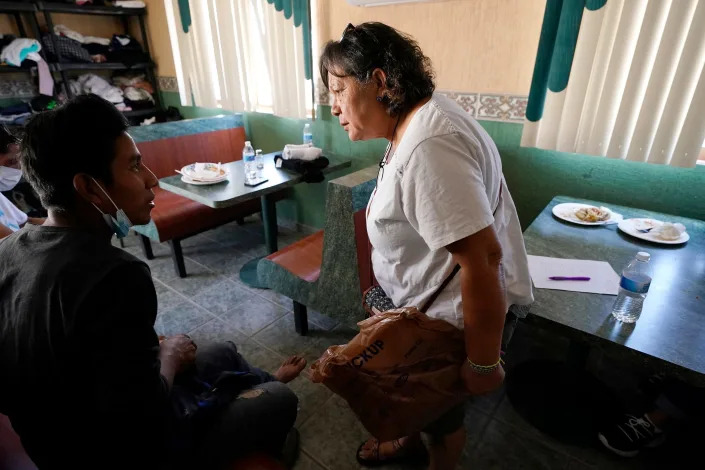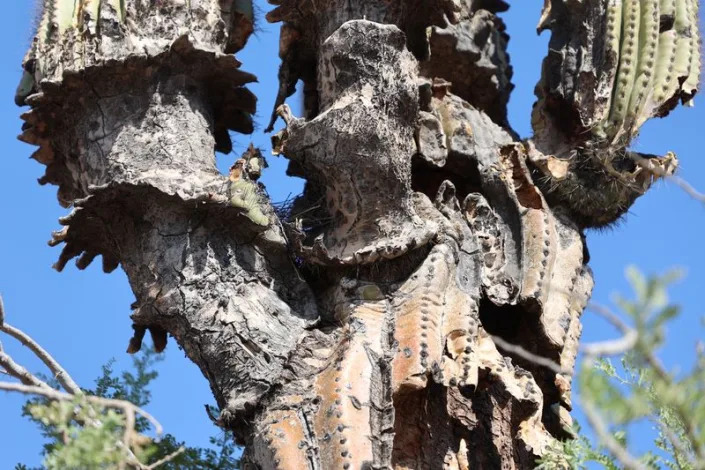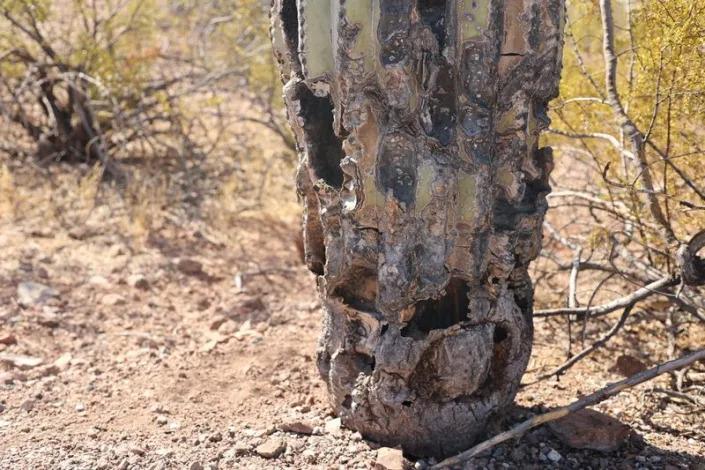Sinead O’Connor’s voice ‘was Ireland right down to the ground’
Singer is remembered as ‘fearless’ and the ‘greatest voice of her generation’.

Sinead O’Connor on the Graham Norton Show in 2012
(PA) / PA Wire
By Rob Freeman
5 hours ago
Sinead O’Connor has been labelled “the greatest voice of her generation” amid a host of tributes to the Irish singer.
Artists from across the musical spectrum, writers, actors and other celebrities shared their admiration for the often controversial singer, who has died at the age of 56.
Writer Bonnie Greer described O’Connor, who had a massive hit with the Prince song Nothing Compares 2 U, as having a great soul music voice.
She tweeted: “Soul music is not about ‘ooh, baby, baby’. And I know about soul music because I was born and grew up around where Sam Cooke sang… and #Prince knew that #Sinead had it in her, too – that’s why she got his song.
“But her voice was #Ireland right down to the ground.”
The Irish author Marian Keyes described the news as “heartbreaking”, describing the singer as an “amazing, brave, beautiful, unique wonder”, while writer Caitlin Moran said O’Connor was “THE greatest voice of her generation, no contest” and “fearless”.
Victoria Mary Clarke, the wife of The Pogues star Shane MacGowan, thanked O’Connor for her “love and friendship”.
Posting a photo on Twitter of MacGowan and O’Connor together from their younger years, she wrote: “We don’t really have words for this but we want to thank you Sinead.
“For your love and your friendship and your compassion and your humour and your incredible music.
“We pray that you are at peace now with your beautiful boy. Love Victoria and Shane.”
Clarke, who retweeted a picture of the singer and her son Shane who died last year, also remembered her as “incredibly funny” in a second post.
“She told outrageous jokes at the most inappropriate times and she cracked me up! There will never be anyone even remotely like her,” she added.
The singer Cat Stevens, who like O’Connor converted to Islam, said “she was a tender soul”, while singer-songwriter Billy Bragg described her as “braver than brave”.
Smashing Pumpkins singer Billy Corgan posted on Instagram, saying she was “fiercely honest and sweet and funny.
He wrote: “She was talented in ways I’m not sure she completely understood. But Sinead stands alone as a figure from our generation who was always true to the piercing voice within and without. And for that I will always admire and respect her.
“And never forget that she was once cancelled for an act of simple resistance. Her crime? Tearing up a photo.”
Rapper turned actor Ice T tweeted: “Respect to Sinead….. She stood for something… Unlike most people”, while American singer-songwriter Jason Isbell posted: “I hope there’s peace for Sinead at last.”
Among other musicians to post tributes were Belinda Carlisle, Janelle Monae, UB40, Melissa Etheridge, Margo Price and Rage Against The Machine guitarist Tom Morello.
Irish comedian Dara O’Briain said he hoped the singer “realised how much love there was for her”.
Actor Mayim Bialik said “her music changed the industry”, adding O’Connor’s “fierce fearlessness made a tremendous impression” on her as a teenager.
Oscar winner Russell Crowe shared a story about meeting her while working in Ireland last year and enjoying a conversation outside a pub.
He wrote: “In a conversation without fences we roamed through the recent Dublin heatwave, local politics, American politics, the ongoing fight for indigenous recognition in many places, but particularly in Australia, her warm memory of New Zealand, faith, music, movies and her brother the writer.
“I had the opportunity to tell her she was a hero of mine.
“What an amazing woman. Peace be with your courageous heart Sinéad.”
It has been claimed that Sinéad O'Connor has passed away.
The renowned vocalist of "Nothing Compares 2 U," who went away at the age of 56, was reported to have passed away by the Irish Times.The family of the singer released a statement in which they said, "It is with great sadness that we announce the passing of our beloved Sinéad." Her family and friends are heartbroken, and they have asked that their privacy be respected during this extremely trying time.
The Irish singer leaves behind three kids to carry on his legacy. Her son Shane, who had just turned 17, perished away the previous year.Sinead published her farewell message on social media by tweeting a picture of her late son along with the following text: "Been living as undead night beast since. He was the greatest love of my life and the brightest light in my soul.
Fans and celebrities quickly took to social media after hearing the news of Sinead's passing in order to honour the gifted musician and pay tribute to the legacy she leaves behind.
On Twitter, Dara O'Briain sent the following message with his audience: "Ah sh**, Sinead O'Connor has died. The news is certainly very upsetting. How unfortunate. I sincerely hope that she was aware of the amount of affection that was directed towards her."Sinead was the very definition of what it meant to have a punk spirit. She refused to give in to anything, which made her life more difficult than it would have been otherwise. Tim Burgess, frontman for The Charlatans, expressed his wish on Twitter for the musician's well-being, writing, "Hoping that she has found peace."Jedward, who previously competed on X Factor, tweeted, "Rest in Peace." Sinead O'Connor expressed her sadness upon hearing the news. She was a true Irish icon of our generation. This was the first year that we had the pleasure of meeting her, and we found her to be cheerful, as well as quite hospitable and possessing a great heart.
O'Connor rose to prominence in the late 1980s with the release of her debut album, titled The Lion and the Cobra. In 1990, she attained worldwide popularity with a new arrangement of the song "Nothing Compares 2 U" by Prince. O'Connor was born Sinéad Marie Bernadette O'Connor in Dublin on December 8, 1966.
O'Connor has maintained throughout her career that she was subjected to physical abuse following the dissolution of her parents' marriage when she was eight years old. This allegation is elaborated upon in the song "Fire on Babylon" that she wrote.
Her problems with stealing and truancy at the age of 15 led to her being committed to a Magdalene Asylum for 18 months in 1979, and it was during this time that she first became interested in music. It was here that she began to develop her writing and music, and it was the drummer of the popular Irish band Tua Nua that "discovered" her, which led to her going on to co-write their song "Take My Hand."
She left the band Tonne Tonne Macoute in 1985 and travelled to London, where she was signed to Ensign records after moving there while she was playing with the band.
At the age of 20, while she was in the studio making her debut album, The Lion and the Cobra, she discovered that her session drummer John Reynolds was the father of her unborn child.They tied the knot in 1987 and went on to have a son named Jake.
O'Connor was nominated for a Grammy after the reception of her debut album, which was praised as "a sensation" and achieved the distinction of a gold record. She had already created the identity that we have come to connect her with by the time her second album, I Do Not Want What I Haven't Got, was released in 1990. This identity includes her signature shaven head, which has become synonymous with her.
Acclaimed and outspoken Irish singer Sinead O’Connor dies at 56
Known for her shaved head and fierce voice, she shot to fame with her cover of Prince’s ballad ‘Nothing Compares 2 U’.
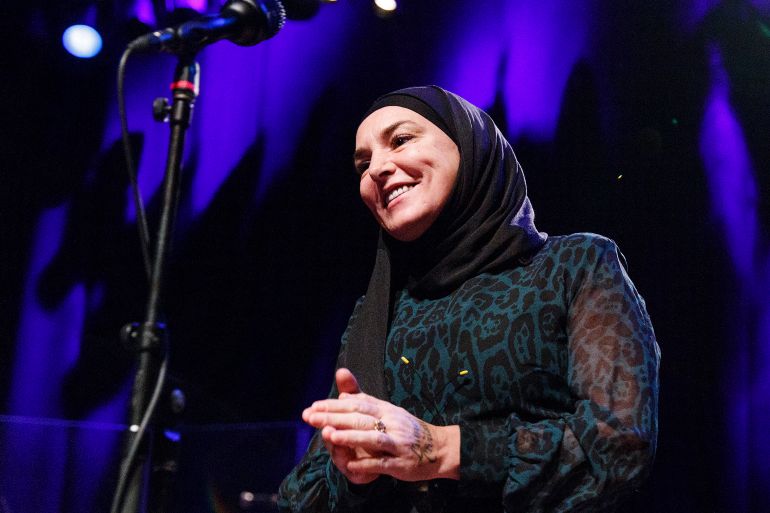
Known for her shaved head and fierce voice, she shot to fame with her cover of Prince’s ballad ‘Nothing Compares 2 U’.

Irish singer-songwriter Sinead O'Connor, known for her 1990 global hit, Nothing Compares 2 U, has died at the age of 56
[File: Andrew Chin/Getty Images]
Published On 26 Jul 202326 Jul 2023
Irish singer-songwriter Sinead O’Connor, known for her 1990 global hit, Nothing Compares 2 U, has died at the age of 56.
“It is with great sadness that we announce the passing of our beloved Sinead. Her family and friends are devastated and have requested privacy at this very difficult time,” Irish national broadcaster RTE quoted a statement from the singer’s family as saying on Wednesday.
She crashed onto the global music scene at the beginning of the ’90s with her mesmerising version of the song originally written by pop icon Prince, facing directly into the camera for the music video that has subsequently been viewed almost 400 million times on YouTube.
“Her music was loved around the world and her talent was unmatched and beyond compare,” Irish Prime Minister Leo Varadkar posted on messaging platform X, formerly known as Twitter, sharing his condolences with “all who loved her music”.
O’Connor changed the image of women in music in the early 1990s.
Her shaved head, pained expression, and shapeless wardrobe were seen by many young women as a direct challenge to popular culture’s long-prevailing notions of femininity and sexuality.
The gifted singer was known for speaking up about her struggles with mental health issues, especially after being diagnosed with bipolar disorder. Her teenage son Shane died by suicide in 2022.
O’Connor was also vocal about her political stance against the Catholic Church. She will be remembered in some quarters for ripping up a photo of Pope John Paul II during a television appearance on “Saturday Night Live” in October 1992.
For many years, she called for a full investigation into the extent of the church’s role in concealing child abuse by clergy.
In 2010, when Pope Benedict XVI apologised to Ireland to atone for decades of abuse, O’Connor condemned the apology for not going far enough and called for Catholics to boycott Mass until there was a full investigation into the Vatican’s role, which by 2018 was making international headlines.
“People assumed I didn’t believe in God. That’s not the case at all. I’m Catholic by birth and culture and would be the first at the church door if the Vatican offered sincere reconciliation,” she wrote in the Washington Post in 2010.
O’Connor converted to Islam in 2018 and changed her name to Shuhada Sadaqat, though continued to perform under the name Sinead O’Connor.
“I read chapter two of the Quran and I realised I’m home, and that I’ve been a Muslim all my life. There’s a way of thinking,” she said in an interview on RTE’s Late Late Show in September 2019.
“You can be a Muslim without actually being a Muslim as it’s a headset [mindset].”

SOURCE: AL JAZEERA AND NEWS AGENCIES
Published On 26 Jul 202326 Jul 2023
Irish singer-songwriter Sinead O’Connor, known for her 1990 global hit, Nothing Compares 2 U, has died at the age of 56.
“It is with great sadness that we announce the passing of our beloved Sinead. Her family and friends are devastated and have requested privacy at this very difficult time,” Irish national broadcaster RTE quoted a statement from the singer’s family as saying on Wednesday.
She crashed onto the global music scene at the beginning of the ’90s with her mesmerising version of the song originally written by pop icon Prince, facing directly into the camera for the music video that has subsequently been viewed almost 400 million times on YouTube.
“Her music was loved around the world and her talent was unmatched and beyond compare,” Irish Prime Minister Leo Varadkar posted on messaging platform X, formerly known as Twitter, sharing his condolences with “all who loved her music”.
O’Connor changed the image of women in music in the early 1990s.
Her shaved head, pained expression, and shapeless wardrobe were seen by many young women as a direct challenge to popular culture’s long-prevailing notions of femininity and sexuality.
The gifted singer was known for speaking up about her struggles with mental health issues, especially after being diagnosed with bipolar disorder. Her teenage son Shane died by suicide in 2022.
O’Connor was also vocal about her political stance against the Catholic Church. She will be remembered in some quarters for ripping up a photo of Pope John Paul II during a television appearance on “Saturday Night Live” in October 1992.
For many years, she called for a full investigation into the extent of the church’s role in concealing child abuse by clergy.
In 2010, when Pope Benedict XVI apologised to Ireland to atone for decades of abuse, O’Connor condemned the apology for not going far enough and called for Catholics to boycott Mass until there was a full investigation into the Vatican’s role, which by 2018 was making international headlines.
“People assumed I didn’t believe in God. That’s not the case at all. I’m Catholic by birth and culture and would be the first at the church door if the Vatican offered sincere reconciliation,” she wrote in the Washington Post in 2010.
O’Connor converted to Islam in 2018 and changed her name to Shuhada Sadaqat, though continued to perform under the name Sinead O’Connor.
“I read chapter two of the Quran and I realised I’m home, and that I’ve been a Muslim all my life. There’s a way of thinking,” she said in an interview on RTE’s Late Late Show in September 2019.
“You can be a Muslim without actually being a Muslim as it’s a headset [mindset].”

Sinead O’Connor performs during her concert at Akvarium Klub in Budapest, Hungary, December 9, 2019
[File: Marton Monus/EPA-EFE]
SOURCE: AL JAZEERA AND NEWS AGENCIES
In Pictures
Sinead O’Connor, superstar singer and lifelong nonconformist
The gifted Irish performer was known for her shaved head and fierce and expressive voice.


Sinead O’Connor, superstar singer and lifelong nonconformist
The gifted Irish performer was known for her shaved head and fierce and expressive voice.

Sinead O'Connor performs on stage at Glastonbury , United Kingdom, in 1990.
[Martyn Goodacre/Getty Images]
AL JAZEERA
Published On 27 Jul 2023
Sinead O’Connor, the gifted Irish singer-songwriter who became a superstar in her mid-20s and was known as much for her private struggles and activism as for her fierce and expressive music, has died at 56.
“It is with great sadness that we announce the passing of our beloved Sinead. Her family and friends are devastated and have requested privacy at this very difficult time,” the singer’s family said in a statement. No cause was disclosed.
Recognisable by her shaved head and with a multi-octave mezzo-soprano of extraordinary emotional range, O’Connor began her career singing on the streets of Dublin and soon rose to international fame.
She was a star from her 1987 debut album, The Lion and the Cobra, and became a sensation in 1990 with her cover of Prince’s ballad “Nothing Compares 2 U”, a seething, shattering performance that topped charts from Europe to Australia and was heightened by a promotional video featuring the grey-eyed O’Connor in intense close-up.
“Nothing Compares 2 U” received three Grammy nominations and was the featured track on her acclaimed album, I Do Not Want What I Haven’t Got, which helped lead Rolling Stone to name her Artist of the Year in 1991.
O’Connor’s other musical credits included the albums, Universal Mother and Faith and Courage, a cover of Cole Porter’s “You Do Something to Me”, from the AIDS fundraising album Red Hot + Blue, and backing vocals on Peter Gabriel’s “Blood of Eden”. She received eight Grammy nominations and in 1991 won for best alternative musical performance.
She was a lifelong nonconformist – she said she shaved her head in response to record executives pressuring her to be conventionally glamorous.
A critic of the Roman Catholic Church well before allegations of sexual abuse were widely reported, O’Connor made headlines in October 1992 when she tore up a photo of Pope John Paul II while appearing on NBC’s Saturday Night Live and denounced the church as the enemy.
O’Connor announced she was retiring from music in 2003, but continued to record new material. Her most recent album was I’m Not Bossy, I’m the Boss, released in 2014, and she sang the theme song for Season 7 of Outlander.
In 2018 O’Connor converted to Islam and adopted the name Shuhada’ Davitt, later Shuhada Sadaqat — although she continued to use Sinead O’Connor professionally.
Published On 27 Jul 2023
Sinead O’Connor, the gifted Irish singer-songwriter who became a superstar in her mid-20s and was known as much for her private struggles and activism as for her fierce and expressive music, has died at 56.
“It is with great sadness that we announce the passing of our beloved Sinead. Her family and friends are devastated and have requested privacy at this very difficult time,” the singer’s family said in a statement. No cause was disclosed.
Recognisable by her shaved head and with a multi-octave mezzo-soprano of extraordinary emotional range, O’Connor began her career singing on the streets of Dublin and soon rose to international fame.
She was a star from her 1987 debut album, The Lion and the Cobra, and became a sensation in 1990 with her cover of Prince’s ballad “Nothing Compares 2 U”, a seething, shattering performance that topped charts from Europe to Australia and was heightened by a promotional video featuring the grey-eyed O’Connor in intense close-up.
“Nothing Compares 2 U” received three Grammy nominations and was the featured track on her acclaimed album, I Do Not Want What I Haven’t Got, which helped lead Rolling Stone to name her Artist of the Year in 1991.
O’Connor’s other musical credits included the albums, Universal Mother and Faith and Courage, a cover of Cole Porter’s “You Do Something to Me”, from the AIDS fundraising album Red Hot + Blue, and backing vocals on Peter Gabriel’s “Blood of Eden”. She received eight Grammy nominations and in 1991 won for best alternative musical performance.
She was a lifelong nonconformist – she said she shaved her head in response to record executives pressuring her to be conventionally glamorous.
A critic of the Roman Catholic Church well before allegations of sexual abuse were widely reported, O’Connor made headlines in October 1992 when she tore up a photo of Pope John Paul II while appearing on NBC’s Saturday Night Live and denounced the church as the enemy.
O’Connor announced she was retiring from music in 2003, but continued to record new material. Her most recent album was I’m Not Bossy, I’m the Boss, released in 2014, and she sang the theme song for Season 7 of Outlander.
In 2018 O’Connor converted to Islam and adopted the name Shuhada’ Davitt, later Shuhada Sadaqat — although she continued to use Sinead O’Connor professionally.

Sinead O'Connor sings at the gathering of 20th Anniversary of the March on the British Embassy, on August 19, 1989. [Independent News and Media/Getty Images]


English singer-songwriter Roger Waters performs live on stage with Sinead O'Connor during a concert version of 'The Wall', in Berlin, Germany, on July 21, 1990. [Michael Putland/Getty Images]


Sinead O'Connor with Kurt Cobain of Nirvana, his wife Courtney Love and daughter Frances Bean Cobain at the 10th Annual MTV Video Music Awards, on September 2, 1993. [Kevin Mazur Archive/WireImage via Getty]


Irish pop-star Sinead O'Connor, surrounded by security guards, takes cover behind a plastic bag as she leaves a shop in the Old Town of Jerusalem June 15, 1995. [Reuters]


Musicians Sinead O'Connor and Davy Spillane - holding a low whistle - backstage during an episode of the David Letterman Show in New York, on June 15, 1998. [Gary Gershoff/Getty Images]


Broadcaster Gay Byrne and musician Sinead O'Connor on the final episode of the Late Late Show, on May 21, 1999. [David Conachy/Independent News and Media via Getty Images]
Advertisement
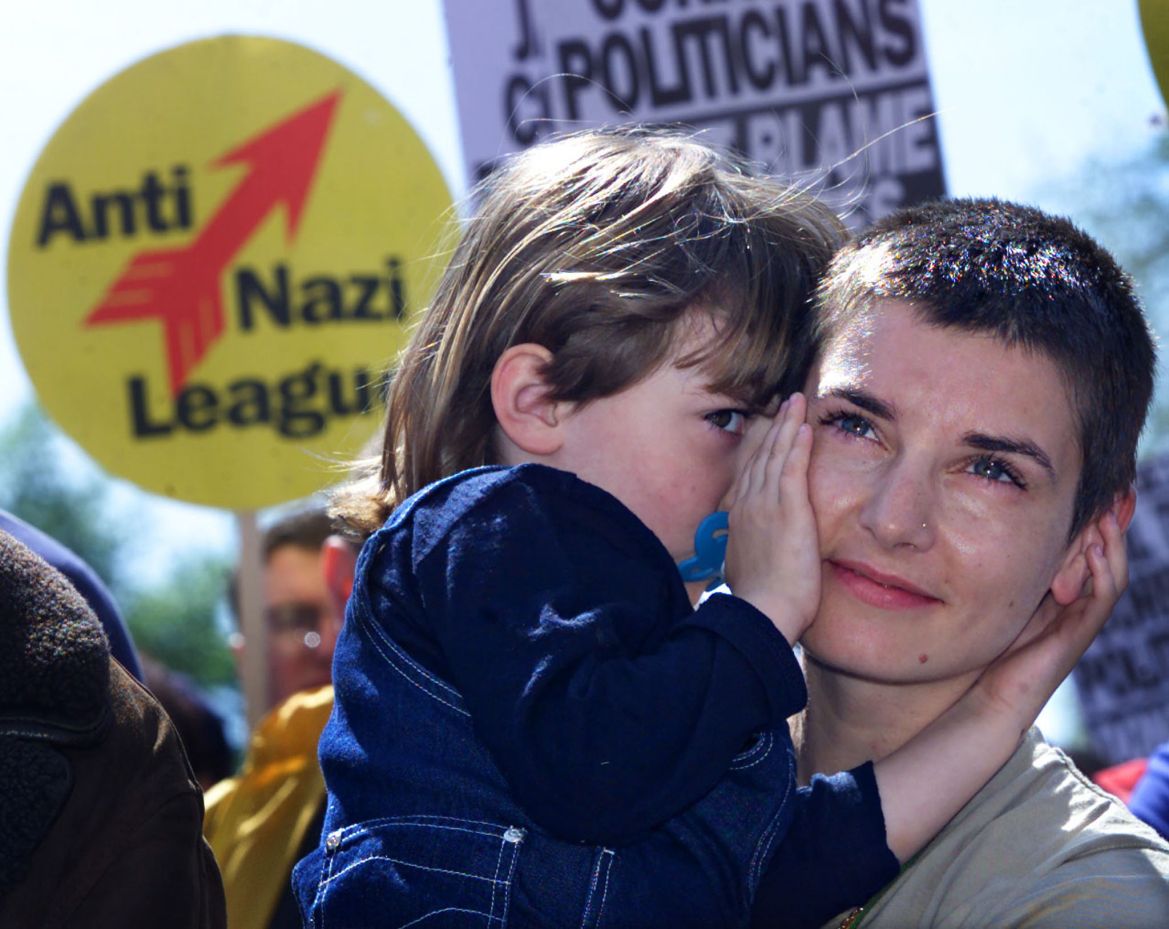
Advertisement

Irish singer Sinead O'Connor hugs her daughter Roisin during an anti-racism demonstration in Dublin city centre, on May 13, 2000. [Reuters]


Burning Spear and Sinead O'Conner during 5th Annual Jammy Awards at Madison Square Garden Theater in New York City, on April 26, 2005. [E. Dougherty/WireImage]


Sinead O'Connor and Craig Ferguson during The Late Late Show with Craig Ferguson on October 5, 2005 at CBS Televsion City in Los Angeles, California. [Jesse Grant/WireImage]


(L-R) Actor Sean Penn, singer Sinead O'Connor, CAA Managing Director Bryan Lourd and actress Sandra Bullock attend The 2011 amfAR Inspiration Gala Los Angeles held at the Chateau Marmont on October 27, 2011 in Los Angeles. [Jeff Vespa/Getty Images for amfAR]


Actress Glenn Close, recording artist Sinead O'Connor and composer Brian Byrne attend the Albert Nobbs soundtrack release party at Palihouse on January 6, 2012 in West Hollywood, California. [David Livingston/Getty Images]


Sinead O'Connor performs her Christmas Show on stage at the Royal Festival Hall on December 10, 2013 in London. [Joseph Okpako/Redferns via Getty Images]


Sinead O'Connor and American Blues musician Buddy Guy perform onstage together at Buddy Guy's Legends nightclub, Chicago, Illinois, on January 22, 2016. [Paul Natkin/Getty Images]


Sinead O'Connor performs at the O2 Shepherd's Bush Empire on December 16, 2019 in London. [Gus Stewart/Redferns]


Sinead O'Connor receives the Classic Irish Album award for I Do Not Want What I Haven’t Got at the RTE Choice Music Prize at Vicar Street on March 9, 2023 in Dublin.
[Kieran Frost/Redferns]



